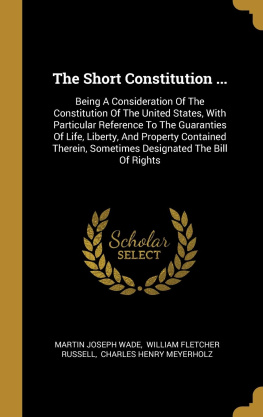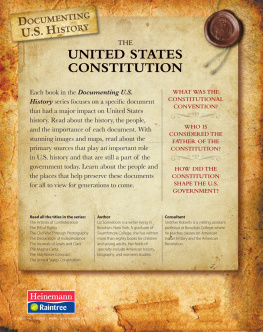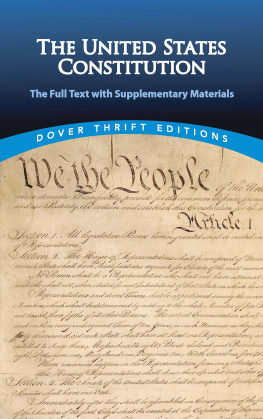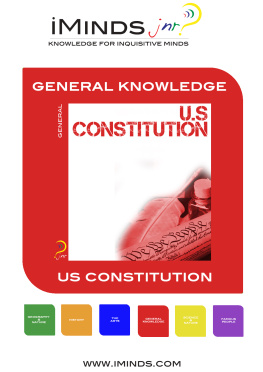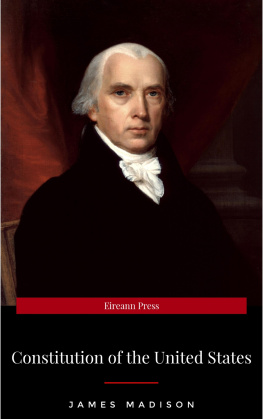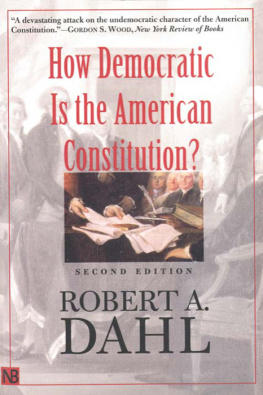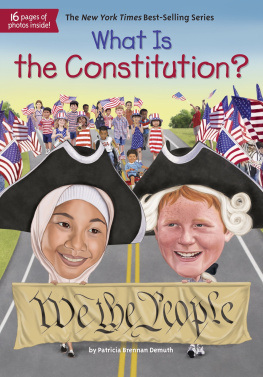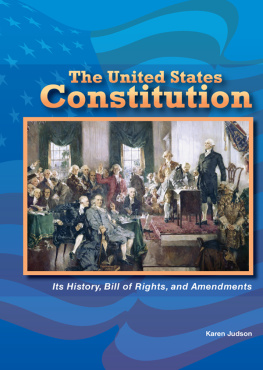[pg 003]
What Has America Done For Me And For My Children?
This question may not be spoken, but it is in the hearts of millions of Americans to-day.
All those who attempt to teach Americanism to foreigners, and to Americans , must be prepared to answer this question . It can only be answered by teaching the individual guaranties of the Constitution of the United States, and of the States, which protect life and liberty and property.
It can only be answered by convincing the people that this is a land of justice and of opportunity for all; that if there be abuses, they are due not to our form of government, but that the people are themselves to blame, because of [pg 004] their ignorance of their rights, their failure to realize their power, and their neglect of those duties which citizenship imposes.
All over the land earnest men and women are endeavoring to teach the great truths of Americanism, and with substantial success; but those who understand human nature realize that the faith of our fathers can only be firmly established by lighting the fires of patriotism and loyalty in the hearts of our children. Through them the great truths of our National life can be brought into the homes of the land.
And the Nation will never be safe until the Constitution is carried into the homes, until at every fireside young and old shall feel a new sense of security in the guaranties which are found in this great charter of human liberty, and a new feeling of gratitude for the blessings which it assures to this, and to all future generations.
[pg 007]
About The Authors
For a work designed to promote education in the spirit of American citizenship it would be difficult to imagine a more competent authorship than that which has been provided for The Short Constitution . Either of the writers alone would have produced a book of high standing in this field; the collaboration of the two makes it a remarkable production in its adaptation to the subject for home reading, the study club, and the school curriculum. It is unique, and has justly been termed the first real attempt to popularize Constitutional law.
Federal Judge Martin J. Wade has had a varied contact with people in his long experience as practicing attorney, district judge, member of Congress, and Judge of the United States Court. A well known Iowa publicist, he has gained nation wide fame as a public speaker and writer on Americanization and citizenship topics, basing his themes on first-hand experiences with conditions which have produced much unrest throughout the Nation. As a member of the State Council of National Defense during the World War, and as presiding judge at the trial of many obstructionists in that period, he conceived the idea of the need for a school of Americanism, to teach what our country has done for its citizens. Clearness and eloquence mark his public addresses, and have enriched the arguments and illustrations of this first book of the Elementary Americanism Series .
Dean William F. Russell was the educational adviser sent with a group of experts by appointment of the President of the United States to advise disorganized Russia during the latter part of the World War; and also one of the five members of the China Educational Commission of North America, sent to China in 1921. His course of study in American [pg 008] citizenship, written at the request of the National Masonic Research Society for use throughout the United States, was inspired by the observation that the government in Russia, in contrast with our own, was an agency that took money for its coffers and boys for its armies and gave nothing in return. In addition to his work as Dean of the College of Education of the State University of Iowa, and his record as a widely-known lecturer on educational topics, he has found time to write school texts notable for accurate and concise statement, adapted to arousing and sustaining interest in the student mind.
The authors have done more than present the facts about the Constitution of the United States, with particular emphasis on its personal guaranties. They have vitalized a topic generally thought to be dry and technical. They have succeeded in making the Constitution seem to be what it is, a factor of first importance in the daily life of the average citizen. It is not too much to say that the seed of this book should be planted in every home in America.
The admirable work of annotation by Professor Chas. H. Meyerholz, Professor of Social Science in the Iowa State Teachers College, gives much additional material for elementary and advanced study. Professor Meyerholz is well known as an authoritative teacher, writer, and lecturer on subjects pertaining to government, and has done much valuable Americanization work.
The elementary and advanced questions at the end of each chapter will serve as a guide to all teachers and leaders of study classes. The text of the Declaration of Independence and the Constitution of the United States, with the original capitalization and punctuation preserved, and an abridgement of a State Constitution, printed at the end of the book, are valuable for reference.
The Publisher
[pg 009]
Preface
The Short Constitution is one of a series of volumes entitled Elementary Americanism , intended for use in the home, the club, the school, and in general Americanization work.
It is our hope that regular courses in Americanism will soon be established in all schools, colleges, and universities.
We use the term Americanism because we feel that it signifies something broader, deeper, and more appealing than any title now used in the schools in the teaching of American government, or citizenship, or the rights and duties of the citizens of the United States.
We like the term America better than the United States . The United States suggests boundaries, codes, and constitutions. America suggests all these and then it suggests spirit . There is such a thing as Americanism . It includes all there is of information relating to our country; but it also has a soul Americanism relates to democracy, into which enter all the ideals, all the impulses and emotions of men, women, and children. Americanism teaches not only the relation of the States to the National government, and the relation of citizens to both the State and the National government, but it also teaches the relation of men, women, and children to each other.
This is a government by the people, and therefore we must understand the people in order that we, the people, may govern.
To arouse patriotism and loyalty we must do more than develop the powers of the mind, do more than expand the field of knowledge. We must inspire in the heart faith, confidence, and love. Men must not only learn how to govern, but they must learn how to be governed. We must not only learn to command, but also to obey. Our spirits must be so [pg 010] molded that we can submit to duly constituted authority, submission to which is the most lofty expression of American patriotism.
Submission to authority in America is submission to law, for no man in this country has any authority to command or direct a fellowman, except as the law made by the people vests him with such authority.
To inspire devotion to our country we must arouse in the hearts of our people a sense of gratitude for the blessings which come to us because we live in free America, gratitude for the rights and liberties which we possess, which are protected by the guaranties of a written Constitution adopted by the people themselves.
There is only one way in which the average person may be brought to see what America has done for him, and that is by contrasting the rights, privileges, and opportunities which he has with those possessed by others in the same walk of life before the Constitution became the bulwark of the people against injustice and wrong.

